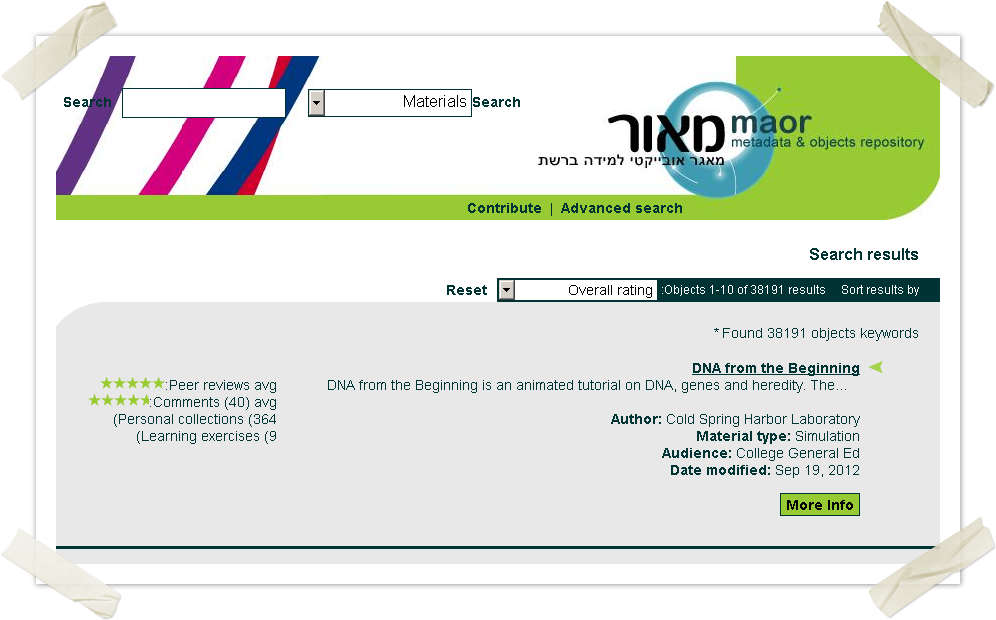...
A: Deep search can be done on rich metadata that can find content that is most likely hided from Google Search or other web search engines.
Meeting minutes
- 1st meeting: 25 June 2012
- 2nd meeting: 21 September 2012
- 3rd meeting planned...
1st VC Minutes (25 June 2012)
...
- Eli (IUCC) gave a brief overview about MAOR. MAOR is a national metadata and object repository used in Israel. Several institutional content repositories are attached to MAOR nationally.
- The importance of having a pan-European level repository to reach the critical mass and successfully participate in global repositories was emphasized. The layered model should include the institutional, national, pan-European and global aggregation levels.
- Eli demonstrated the pilot portal installation based on MAOR (see the screenshot)
- All the important metadata is included but not the content itself. In addition to the metadata, paradata (e.g., comments, ratings, etc.) can also be included (see left hand side) that is collected by the user community and added to the object.
- The participating repositories can be connected to the MAOR-based portal online via API or offline. It was mentioned that the automated, easy metadata export function is essential for the participating repositories.
- There was a question what the added value of the TERENA OER to the national repositories would be. Jack (TUA) explained that reaching the critical mass is important.
- Eli (IUCC) added that there are millions of contents e.g., in GLOBE and it is hard to find anything without good quality metadata (i.e. YouTube syndrome). Good quality metadata is the key although we should consider the minimum set of metadata (in the pilot) for basic search.
- The pilot portal is the very first, basic installation for test/demo purposes. Later on, value-added features can be implemented such as web services, APIs, inclusion of YouTube channels, etc.
- Carlos (UPV) added that the universities can hardly be convinced to directly participate in the TERENA OER portal simply because the YouTube hits are ranked higher in Google search and universities rather upload their lectures to YouTube education channels. However, it is possible to automatically harvest metadata from the university repositories without engaging with the universities.
2.) DSpace-based portal with PuMuKit at University of Vigo
- Vicente (UVigo) gave a brief introduction to DSpace. DSpace is being used at University of Vido as as institutional repository.
- Professors are not really keen on searching materials in the repository, though. They prefer Google, perhaps because they only know Google.
- Stepping up from the institutional level to the national and pan-European level might help promoting better our content repositories. Filling the gap between the national level and the global level is the major role of the TERENA OER.
- TERENA OER can have value added benefits compared to Google search, such as the deeper search in metadata and the clearly licensed materials. Creative Common licensing is the potential way forward, must be added to the portal in the future.
- Eli (IUCC) commented that the service provider view is different from the end-user view. TERENA OER must be considered as a provider. Links between objects, information about who searches for what, who comments on what, etc. are all very important for the provider.
- Vicente (UVigo) noted that from the end-user point of view, added features such as embeded video player to the portal or mosaic thumbnail representation of the targets are important. Must be considered in a later phase as enhancements.
- DSpace is only used for aggregation, no content enrichment in included. It is about the enrichment of the user experience and not the enrichment of the content itself.
- Vicente (UVigo) summarized that the DSpace-based implementation is better for institutional purposes rather than for a pan-European aggregation portal.
- It was agreed to drop the DSpace-based option!
3.) 2.) ARIADNE-based pilot portal installation done by GRNET: http://83.212.100.142:8080/terena-finder/?query=*
- Giannis (GRNET)
- Giannis demonstrated the pilot portal installation based on ARIADNE (see the screenshot)
...
